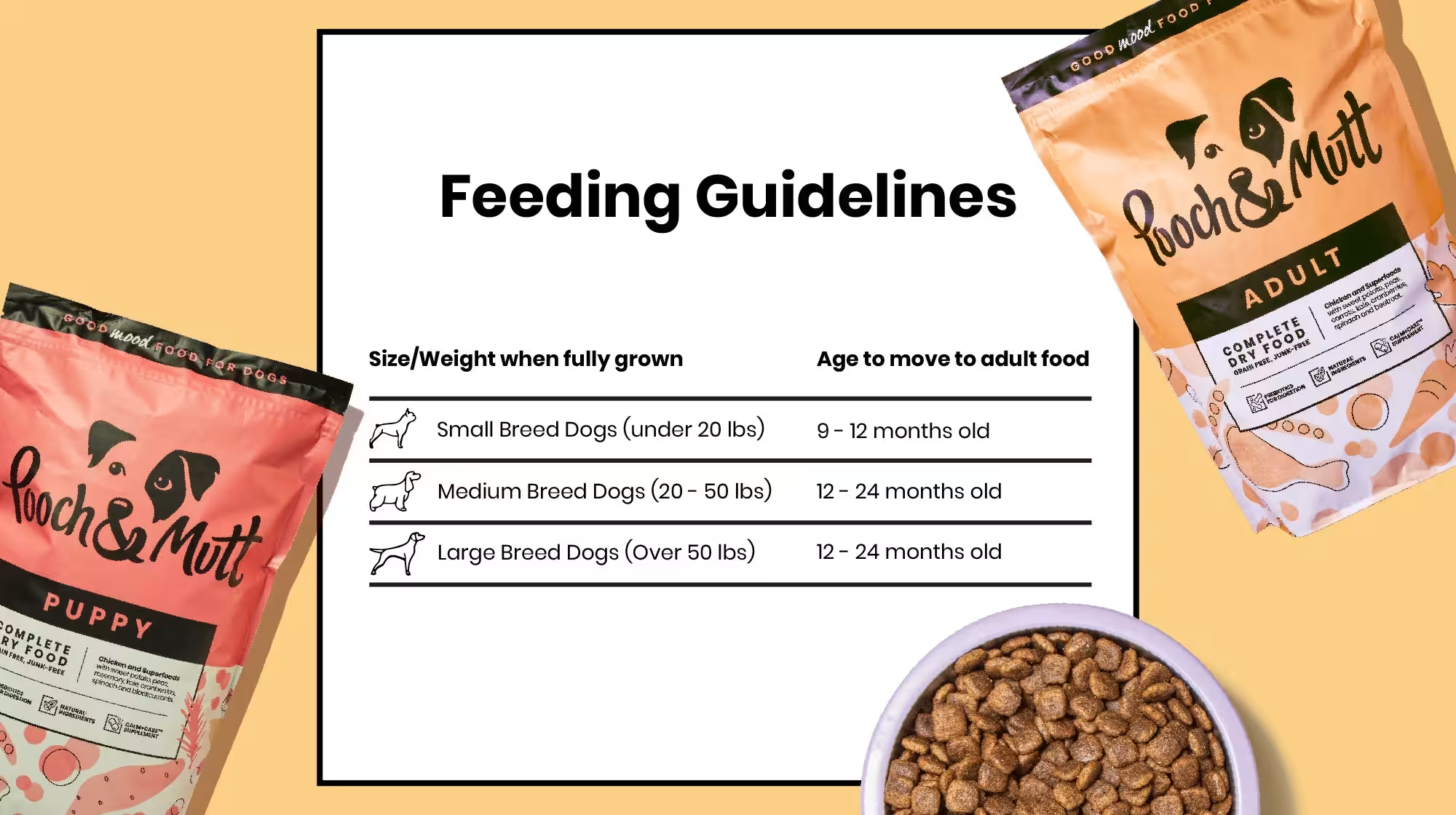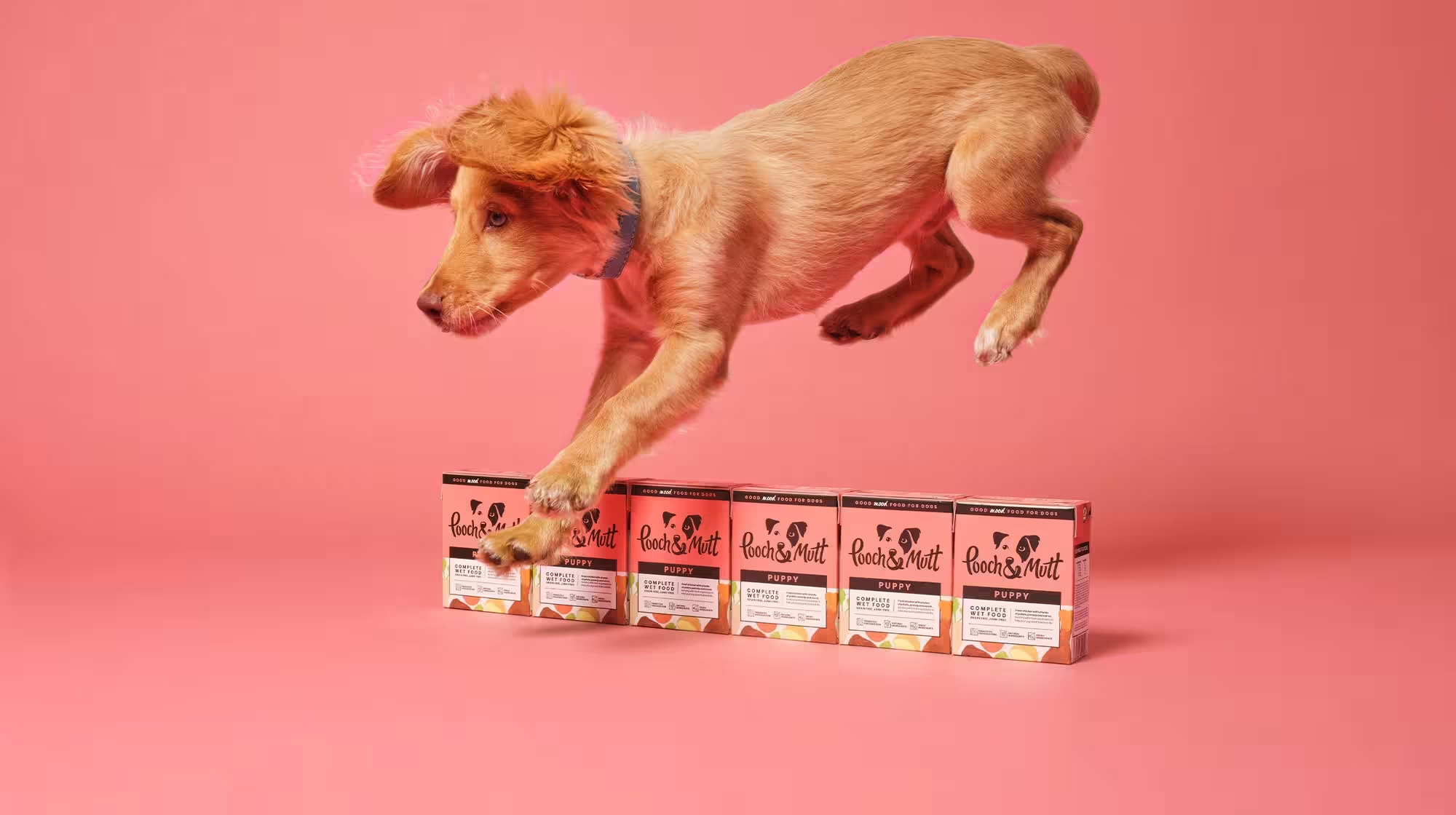Puppies grow up so fast - it doesn’t take long for what was once a sleepy ball of fuzz to become a curious and excitable playmate that gets bigger and smarter by the day.
Anyone lucky enough to have raised a puppy in their homes will know; pups need special food, full of proteins, fats, vitamins and minerals to help them develop. But when the time comes, how will you know whether to switch your young pooch to regular adult dog food?
Here are the signs that it may be time to wave goodbye to puppy food and transition your dog into an adult dog food diet…
What’s the difference between adult dog food and puppy food?
If you’ve ever owned a puppy or puppies, you were likely recommended they eat special puppy food rather than regular dog food. This is because, after they’ve weaned off mum’s milk, puppies need a complete blend of developmental nutrition to fuel their growth and functioning at this crucial stage of life.
Puppy food is usually nutrient-dense and rich in calories, with lots of proteins to build their physical strength. It may also contain a boost of certain minerals such as calcium and phosphorus, important for building bones and teeth.
The healthiest puppy food is made with natural ingredients, without preservatives, junk or added sugars; and our grain-free food for puppies also avoids the wheat and grain-based fillers that dogs can be allergic to.
An adult dog should still eat a complete and balanced diet packed with nutrients to get everything their bodies need to harmoniously function.
However, unlike puppy food, regular adult food is usually lower in calories and fats and contains leaner ingredients - this is because a fully grown dog doesn’t need to put on the weight that a puppy does.


Puppy Complete Dry Superfood
A complete, grain free puppy food, to give them the best start in life. This premium recipe includes a rainbow of ingredients, to provide essential goodness for your growing pup.
-
Aids growth & development
-
Kind to tummies
-
Chicken & Superfoods
Current price: £8.99
Puppy Complete Dry Superfood
Is it ok to give a puppy regular food?
A puppy can eat adult food if it’s the only option available (if you’ve run out of puppy food without realising, for example), but it’s really important that puppies eat food that’s been specially formulated for them.
Keeping stocked up with puppy food means your pup’s still-growing body is getting the proteins, amino acids, vitamins, minerals and fats it needs to develop and function.
Puppies have very different nutritional needs to adult dogs, and a deficit of essential nutrients could result in developmental issues; such as fractured bones, heart disease, or bone marrow problems.
When to switch from puppy food to adult dog food?
As your once baby pooch becomes a youthful, bounding whirlwind in your home, you may start to wonder when to ditch the puppy food. There are several signs to look out for to know your dog is finally a grown up girl or boy:
They’re leaving some food in their bowl. As mentioned, puppy food is high in fats and calories, which is necessary for pups, but will fill an adult dog up relatively quickly. If your dog is getting full after just a few bites and regularly leaving leftovers, puppy food is becoming too rich for them.
They don’t need feeding so often throughout the day. Puppies are usually fed frequently and often, and they’ll lap up all the food they’re given. If you’re getting the sense your dog doesn’t expect feeding or doesn’t seem hungry, they could transition to more standard mealtimes (i.e., morning and evening).
Age-wise, they’ve reached maturity. The age of maturity varies for a dog depending on their breed and their size - according to the table below. When your dog is within this age bracket, and is showing other signs of going off their food, it’s probably time to move up to adult food.
You’ll notice that the ages vary dramatically - for a large breed dog, it can be as late as two years old before they’re ready for adult food.

How to Switch from Puppy Food to Adult Dog Food
Though puppies are supposedly fully grown when they’re ready for adult food, it doesn’t mean their tummies aren’t still sensitive to dietary changes.
Switching suddenly from puppy to adult food could cause dodgy digestive issues in your pooch - so to avoid gassiness, bloating, sickness or diarrhoea, try to gradually introduce the new food into your dog’s meal time routine over a few days.
Day one: On the first day of transition, add around a quarter of the bowl with adult food, three quarters puppy food.
Day two: The next day, try half and half of both adult and puppy food.
Day three: On the third day, try a ratio of three quarters adult food with a quarter of puppy food.
Day four: By day four, your pup should be ready for 100% adult food.

During this transitionary period, be sure to check your dog’s behaviour and digestive functioning. If they have toilet trouble on the 50/50 day, for instance, perhaps try another ‘day one’ ratio.
Soon enough, your pup will have graduated into a fully adult diet. A similar approach is needed when changing over your dog's food to a different type or brand. To explore this in further detail, be sure to check out our article, ' How to safely change your puppy's food '.
If you’re ready to transition your puppy to an adult food diet, our grain-free food for dogs has everything a pooch needs for a healthy and well-functioning body and mind.
If you’re still feeding a growing puppy, try our tasty grain-free puppy food , too. If you are still unsure, you can always check out our puppy feeding guidelines !
Dog Food Range
-

 from
fromCurrent price: £15.99
Joint Care Dry Food -

 from
fromCurrent price: £15.99
Slim & Slender Dry Food -

 from
fromCurrent price: £8.49
Health & Digestion Dry Food -

 from
fromCurrent price: £19.99
Gastrointestinal Dry Dog Food -

 from
fromCurrent price: £18.99
Primal Wild Boar High Meat Dry Food -

 from
fromCurrent price: £19.99
Sensitivity Dry Dog Food For Allergies -

 from
fromCurrent price: £8.99
Adult Complete Superfood -

 from
fromCurrent price: £1.99
Health & Digestion Complete Wet Food -

 from
fromCurrent price: £2.49
Fish, Potato & Pea Wet Food -

 from
fromCurrent price: £1.99
Calm & Relaxed Complete Wet Food -

 from
fromCurrent price: £2.49
Chicken, Pumpkin & Pea Wet Food













Hi, we've had our first delivery of Pooch & Mutt and we're about to start moving to adult food. Is Pooch & Mutt adult suitable for feeezing if we won't use a carton within 2 days? Thanks
Hi Steven, we've not run any tests on freezing our foods, but can be stored in a cool dry place i.e. cupboard up until opening/expiry. Once opened, it should be stored in a fridge for a maximum of 2 days. If you require any further feeding guidance and how you may be able to ensure this can be used within this time, please do reach out to the team at pooch@poochandmutt.com :)
What a helpful article! I love how you laid out the distinction between puppy and adult food in plain language and supported it with warning signs to look out for. The timeline of when to make the switch was particularly useful—I will be using that guide when it comes time for my little furball to transition. https://www.petsfolio.com/